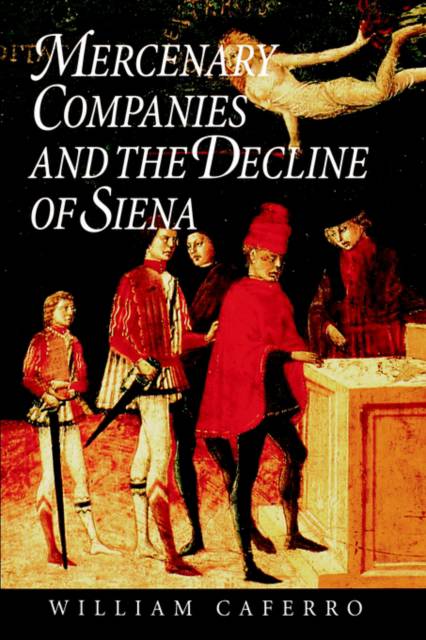
- Afhalen na 1 uur in een winkel met voorraad
- Gratis thuislevering in België vanaf € 30
- Ruim aanbod met 7 miljoen producten
- Afhalen na 1 uur in een winkel met voorraad
- Gratis thuislevering in België vanaf € 30
- Ruim aanbod met 7 miljoen producten
Omschrijving
Among the most dramatic problems faced on the Italian peninsula in the fourteenth century were the raids of marauding mercenary companies. These companies, known locally as Companies of Adventure and more generally as Free Companies, were private armies, composed of professional soldiers and adventurers from throughout Europe. They sold their services to the highest bidder in times of war, and staged ruinous raids in times of peace. The city of Siena, visually opulent and wedged between Florence and the lands of the pope--two frequent employers of mercenaries--was an especial target.
In this groundbreaking volume, William Caferro explores the social, economic and administrative impact of the companies on Siena from the arrival of Werner of Urslingen and the Great Company in 1342 until the fall of the Sienese republic in 1399. During this time, Caferro explains, Siena endured some thirty-seven raids, characterized by arson, pillage, and looting in the countryside and extortion of enormous bribes from the city government. He shows that the raids constituted a persistent and significant drain on both the human and financial resources of Siena. Payments to the companies siphoned off valuable (and limited) funds, damaging an already circumscribed economy, while the government was forced to borrow money on an unprecedented scale from its citizens. Sienese officials pressed money out of every available resource, including the Church (which had previously been taxed only sporadically) and Jews (who were belatedly granted the "right" to lend money to the state). Other desperate measures included pawning land, forcing purchases of salt, and readmitting exiles for a fee. The stresses caused by the mercenaries were greatly exacerbated by plague and famine, which often coincided precisely with the raids--each disaster serving to intensify the effects of the other.
Caferro concludes that the stress of the companies acted as an agent of change on the machinery of state, bringing both decentralization and confusion. If, as some historians have argued, military expenditure led to more streamlined bureaucracies and helped "make" states elsewhere, it is nonetheless clear that the same phenomenon helped "unmake" Siena. The raids, therefore, were more than an exotic nuisance, but a key factor in Siena's decision to abandon independence in 1399.
Specificaties
Betrokkenen
- Auteur(s):
- Uitgeverij:
Inhoud
- Aantal bladzijden:
- 272
- Taal:
- Engels
- Reeks:
- Reeksnummer:
- nr. 116
Eigenschappen
- Productcode (EAN):
- 9780801857881
- Verschijningsdatum:
- 29/05/1998
- Uitvoering:
- Hardcover
- Formaat:
- Genaaid
- Afmetingen:
- 161 mm x 236 mm
- Gewicht:
- 553 g

Alleen bij Standaard Boekhandel
Beoordelingen
We publiceren alleen reviews die voldoen aan de voorwaarden voor reviews. Bekijk onze voorwaarden voor reviews.











